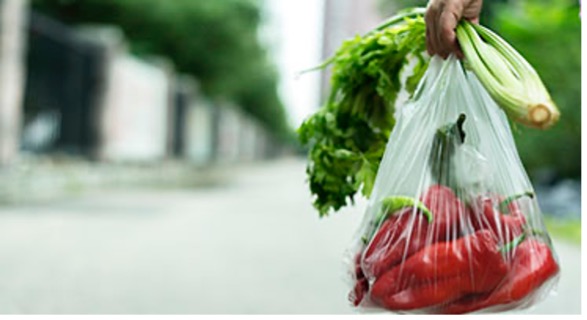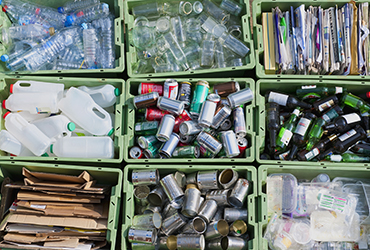Recent Updates
- New B.C. Shopping Bag Fees & Plastics Ban Now in Force Attention legal and sustainability teams: As of July 15, 2024, B.C.’s Single Use and Plastic Waste Reduction Regulation mandates a minimum fee of … Continued
- Prepare for B.C.’s New Plastic Waste Rules, beginning July 15Attention all retailers and quick-service restaurants: The B.C. Single-Use and Plastic Waste Prevention Regulation kicks in on July 15, 2024. There … Continued
- Retailers Invited to Shape the Future of Plastic Waste Management in TextilesAttention all textile and apparel retailers: On July 4, 2024, Environment and Climate Change Canada (ECCC) launched a consultation to develop a … Continued
Plastic packaging and single-use items in retail
Retailers are actively working to make supply chains and packaging more sustainable, including a shift away from plastic checkout bags and other single-use items. Beyond this, retailers are also:
- Removing problematic plastics from supply chains (e.g. expanded polystyrene, etc.),
- Increasing the use of post-consumer recycled content,
- Improving labelling and communicating with customers,
- Simplifying packaging to make recycling easier, and
- Exploring alternatives including reusable and compostable packaging.
In order to improve environmental outcomes and promote innovation, RCC and its members work with all levels of government in addition to manufacturers and other trade associations.
Plastics and alternative issues RCC advocates for on behalf of retailers
Single-use plastics and waste reduction
Municipalities across Canada continue to adopt or are considering adopting bans in an effort to decrease the use of single-use plastic items. While the majority of municipal bans focus on shopping bags, there has been a growing trend around banning other single-use items, including plastic straws, stir-sticks, and polystyrene food packaging, among others.
The federal government has also announced its intention to ban six plastic items as of 2021, including plastic checkout bags, stir sticks, six-pack rings, cutlery, straws and food service ware made from problematic plastics.
Given that municipal bans create a patchwork effect across the country, RCC is currently advocating for a federal ban to provide producers with consistency while improving environmental outcomes.
Alternatives (e.g. reusable/compostable packaging)
In recognition of single-use plastic bans, RCC believes it is important to create clear frameworks and guidelines for alternatives, including reusable and compostable products and packaging. Beyond this, RCC advocates on the need for green infrastructure to ensure alternatives can be properly managed while facilitating best practice sharing through RCC’s Plastics Committee.
To stay informed of single-use item bans, material alternatives and more, members can request to join the Plastics Committee.
Tools and resources
Shopping bag and single-use plastic regulations across Canada
To help you find your way through the patchwork of plastic bag bylaws and regulations, we have assembled a quick reference table.
Overview of federal Single-use Plastics Prohibition Regulations
On June 20, 2022, the Government of Canada released the Single-Use Plastics Prohibition Regulations to ban six categories of single-use plastic (SUPs) items: checkout bags, cutlery, stir sticks, straws, ring carriers and food serviceware. The ban includes various implementation timelines for manufacturing and import, sales and export.
Summary: CCME Roadmap to Strengthen the Management of Single-use and Disposable Plastics
Further to the federal government’s commitment to achieving the Canada-wide Action Plan on Zero Plastic Waste, the Canadian Council of Ministers of the Environment (CCME) has developed A Roadmap to Strengthen the Management of Single-Use and Disposable Plastics. The roadmap provides key priority items for further regulatory consideration and provides jurisdictions direction on options related to management approaches.
Packaging considerations and material alternatives
To help prevent waste from entering the environment and improve the input and output of recycling streams, it is important for companies to regularly review packaging portfolios. Regular reviews can help teams identify opportunities to reduce packaging, remove problematic elements and/or switch to material alternatives.
What is the Canada Plastics Pact (CPP)?
The launch of the Canada Plastics Pact (CPP) on January 27th, 2021 marks the beginning of an exciting opportunity to collaborate with stakeholders and create a circular economy in Canada. RCC is proud to be a founding member of CPP, along with more than 40 partners representing industry, government, NGOs and more.
Reducing the Distribution of Single-use Shopping Bags: A Resource Guide for BC Retailers
Advice and best practices for retailers in B.C.
Compostables 101: Innovative Products and Packaging Webinar
In the summer of 2020, RCC held a webinar to discuss compostables as an alternative to traditional plastics as well as some of the common misunderstandings when it comes to types of materials, standards, infrastructure and more. Panelists included representatives from the Compost Council of Canada, BASF, and Biodegradable Products Institute (BPI).
Éco Entreprises Québec (ÉEQ) Report – Biodegradable and compostable packaging
ÉEQ released a report on the challenges and considerations associated with compostable and biodegradable packaging, including eight recommendations for companies throughout the recovery and recycling value chain.
Member committee
Plastics Committee
The Plastics Committee is actively engaged in monitoring single-use plastics bans across the country to support member compliance while exploring packaging and material alternatives (e.g., reusable options, compostables, etc.). The committee also focuses on best practice sharing for a range of topics including eco-design, recycled content, and improved vendor/customer communications. Committee members advise and support RCC volunteers and staff who sit on stakeholder and advisory/consultative bodies and guide RCC staff in the development and presentation of RCC positions on plastics issues to all levels of government. (Meets monthly)

Contact Harrison Brook, Manager Sustainability at hbrook@retailcouncil.org for questions or more information on:
- Joining EPR/Stewardship and Plastics Committees
- Support on sustainability compliance












